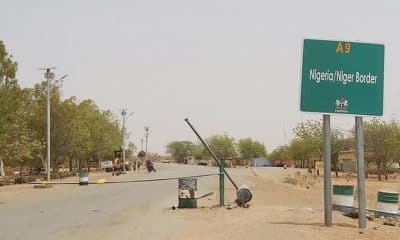Nigeria News
Two Major Reasons Why Land Borders Were Closed For Two Years – Buhari

President Muhammadu Buhari has revealed two major reasons why his government shut all land borders across the country for two years.
Naija News understands that the Federal Government had in a circular through the Nigerian Customs Service last Friday, directed the closed border posts in Idiroko (Ogun); Jibiya (Katsina State) Kamba (Kebbi), and Ikom (Cross River) to be reopened with immediate effect.
The NCS immediately responded to the directive and commenced the reopening of the borders accordingly.
The development has seen Nigerians registering their disappointments, wondering what has been achieved from the long closure of the borders.
Speaking, however, yesterday after the President of Africa Development Bank, AfDB, Dr Akinwumi Adesina, disclosed that the bank has earmarked a $1.5 billion Africa Emergency Food Plan to cushion the effect of the Russia/Ukraine conflict expected to trigger the global food crisis.
President Buhari said the government closed the borders to discourage smuggling and also to encourage local farmers.
The number one citizen said this at a meeting with the AfDB boss in his office in the Presidential Villa, Abuja on Tuesday, Naija News understands.
According to him, much had been achieved from the border closure.
Buhari lauded the AfDB for planning whatever negative consequences might come from the Russia-Ukraine conflict in terms of food security.
He said: “Thank you for knowing our weaknesses and our strengths, and for planning and working ahead.
”We are very much aware of the need for food security, and to encourage our local farmers, that was why we closed our borders for about two years to curb smuggling. We made some progress,” the President said.
In his remarks, Adesina raised the alarm that there might be a fertilizer crisis in Africa which would cause about two million metric tons’ deficit. He said already, that the price of wheat had gone up to about 60 per cent, while maize and other grains would also be affected.
“Already, the price of wheat has gone up to about 60 per cent. Maize and other grains will also be affected. There may be a fertilizer crisis, as there would be about a two million metric tons deficit. And that will affect food production by about 20 per cent. Africa will lose $11 billion worth of food, and coming shortly after COVID-19, that would be rather serious.”
To prepare against the evil day, Dr Adesina said the AfDB had developed a $1.5 billion Africa Emergency Food Plan, which is now before the bank’s Board for approval.
He further said, “We were not ready for COVID-19, but we are now planning to avert food crisis on the continent. There is a plan to help farmers cultivate wheat, maize, rice, sorghum, and soybeans. It will mitigate the impact of the Russia-Ukraine war,” Adesina said.
Talking specifically of Nigeria, the AfDB president and a former Minister of Agriculture in Nigeria, said in the wet season of 2022, at least five million smallholder farmers would be helped to cultivate one million hectares of maize, one million hectares of rice, and 250,000 hectares of sorghum and soybeans, respectively.
He added: “In total, our support will help Nigeria to produce 9.5 million metric tons of food.”
According to him, states that will benefit from the assistance include Kano, Ogun, Oyo, Kaduna, Imo, Cross River, and the Federal Capital Territory.












